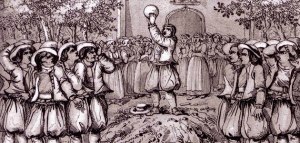10. France Football: Ball games in medieval France
The Norman influence turned English culture on its head, even transforming the English language into something barely recognisable from the way it was spoken just a century or so earlier, so it is perfectly conceivable to imagine football-type games being introduced to the island around the same time.
 Up until the 19th century, the tradition of folk football was every bit as old and strong in France as it ever was in Britain. Indeed, it was written as late as 1827 that “the game of football is but little played in England … and when played is … very inferior to that in the south of Europe, particularly the southern provinces of France.” In fact, if it hadn’t been for France being ravaged by the Napoleonic Wars while Britain was enjoying a period of relative stability, the first rules for modern football would probably have been written in French.
Up until the 19th century, the tradition of folk football was every bit as old and strong in France as it ever was in Britain. Indeed, it was written as late as 1827 that “the game of football is but little played in England … and when played is … very inferior to that in the south of Europe, particularly the southern provinces of France.” In fact, if it hadn’t been for France being ravaged by the Napoleonic Wars while Britain was enjoying a period of relative stability, the first rules for modern football would probably have been written in French.
The oldest known reference to a French ball game was penned by the Bishop of Clermont around 470, and describes something strikingly similar to the Roman piggy-in-the-middle type games, although it is not until the 12th century that we find any further references, when several church records refer to the use of balls, and the Ordinatio de Pila Facienda of Auxerre in 1396 is sometimes called the oldest set of football rules on record. They are nothing of the sort, and like many of the texts from the period probably really refer to the ceremonial use of orbs.
 However, other descriptions describe something that was most definitely football, usually played cross-country between different villages, with lakes, churches and similar landmarks serving as goals. The best known name was ‘soule’ (but not always spelt that way, with variations including ‘choule’, ‘seault’ or ‘cholle’), while other names included ‘savate’, ‘mellat’ and ‘barrette’. Like in Britain, there were clearly kicking and handling varieties, and also games like ‘bastonner à la soule’ and ‘soule la crosse’ that involved hitting the ball with a stick.
However, other descriptions describe something that was most definitely football, usually played cross-country between different villages, with lakes, churches and similar landmarks serving as goals. The best known name was ‘soule’ (but not always spelt that way, with variations including ‘choule’, ‘seault’ or ‘cholle’), while other names included ‘savate’, ‘mellat’ and ‘barrette’. Like in Britain, there were clearly kicking and handling varieties, and also games like ‘bastonner à la soule’ and ‘soule la crosse’ that involved hitting the ball with a stick.
There was probably a direct link between the French and English games, particularly considering such events as the Norman invasion of 1066, but it is not clear which nation, if any, inherited the game from which. Several of the traditions, such as the one that newlyweds should donate a ball to the village, were uncannily similar, and the Cornish Plea Rolls of 1283 even say that the game in which a certain Roger killed another man with a stone was called ‘soule’.
Also like in Britain, there were several cases, the earliest being that by Philippe V in 1319, of ‘loudos soularum’ being banned. But scant good these prohibitions generally did, and particularly in Brittany, which had its own legal system, the game thrived well into the 19th century. A 1799 text describes how “the lord of the village threw a ball into the middle of a noisy crowd, and men of different cantons tried to grab it. Men sometimes threw the ‘soule’ into the sea and drowned as they sought it”, and such things were still going on until as late as 1891 in Boulogne-la-Grasse in Picardy.
 However, by the late 19th century, the game was disappearing and the main reason for that was the importation of codified soccer and rugby from England, the earliest known club in France being one formed in Paris in 1863, playing principally by the rules of Rugby School. France would go on to be a major force in both sports, and is probably more to thank than their inward-looking creators in England for the popularisation of both codes outside of the Anglosphere.
However, by the late 19th century, the game was disappearing and the main reason for that was the importation of codified soccer and rugby from England, the earliest known club in France being one formed in Paris in 1863, playing principally by the rules of Rugby School. France would go on to be a major force in both sports, and is probably more to thank than their inward-looking creators in England for the popularisation of both codes outside of the Anglosphere.
But the response to ‘les sports Anglais’ and their supremacy over French traditional sports was not always a positive one. Like the GAA in Ireland around the same time, Paschal Grousset founded the Ligue Nationale de l’Education Physique to promote national games, and created a new form of football called barette after the traditional French game. Had he not been side-tracked by other issues, Grousset’s plan could have had an enormous effect on the global football map of today.
Click here to buy the book and read the whole story.

Hello blogger, i must say you have high quality posts here.
Your page should go viral. You need initial traffic boost only.
How to get it? Search for: Mertiso’s tips go viral
Pingback: Playing These 10 Games At Parties Could Actually Kill You In Medieval Times - Unheard Facts
Pingback: Playing These 10 Games At Parties Could Actually Kill You In Medieval Times – eRaPot